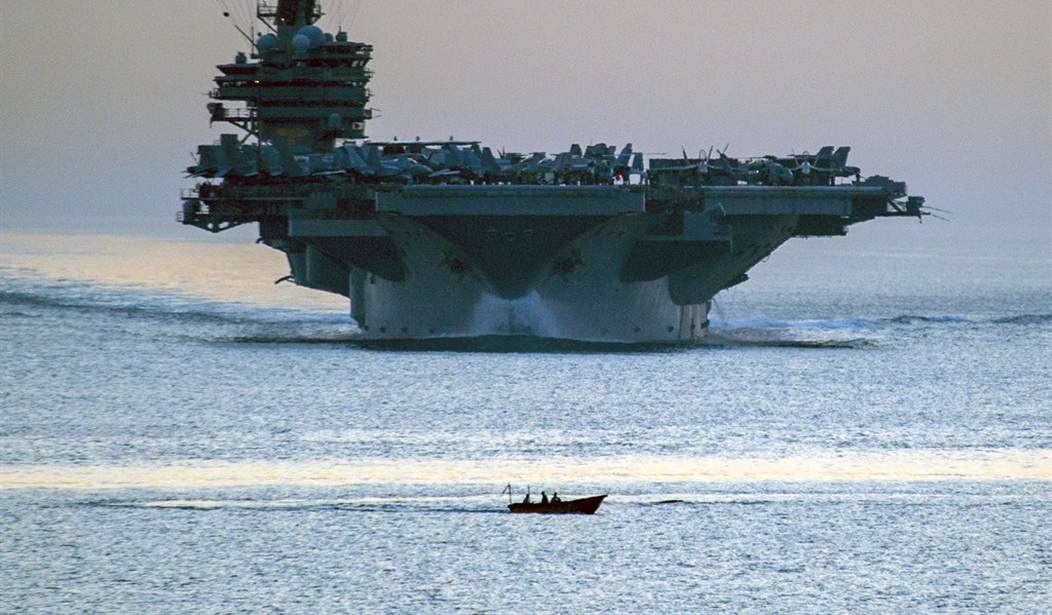In his indecisive and news-less statement on Iraq last Friday, the one red line President Obama appeared to draw was an assurance that he wouldn't send US troops "back into combat" in that nation -- even as radical jihadists seized major cities and obtained American-supplied weapons and supplies, while enriching themselves with a massive haul of looted money. Many observers likely inferred that Obama was ruling out ordering any "boots on the ground" in Iraq, even as he considered a range of options, including airstrikes. Not so, the Associated Press reported last evening. The White House is grappling with the idea of deploying "a small number of American special forces to Iraq," (beyond these 275), though not in an explicit combat role:
While President Barack Obama has explicitly ruled out putting U.S. troops into direct combat in Iraq, the plan under consideration suggests he would be willing to send Americans into a collapsing security situation for training and other purposes. Three U.S. officials familiar with ongoing discussions said the potential of sending special forces to Iraq is high on a list of military options that are being considered. It's not clear how quickly the special forces could arrive in Iraq. It's also unknown whether they would remain in Baghdad or be sent to the nation's north, where the al-Qaida-inspired Islamic State of Iraq and the Levant has overrun several cities in the worst threat to the Shiite-led government since U.S. troops left in 2011...The mission almost certainly would be small: one U.S. official said it could be up to 100 special forces soldiers. It also could be authorized only as an advising and training mission — meaning the soldiers would work closely with Iraqi forces that are fighting the insurgency but not officially be considered as combat troops. The troops would fall under the authority of the U.S. ambassador and would not be authorized to engage in combat, another U.S. official said...Already, about 100 Marines and Army soldiers have been sent to Baghdad to help with embassy security, according to a U.S. official...The White House also is considering launching air strikes and increased surveillance over insurgent bastions to thwart ISIL's march toward Baghdad.
So this tiny force -- "unbelievably small," if you will -- would only be authorized to operate in a logistical support and advisory role, not to engage in combat. One presumes their hypothetical rules of engagement would allow for self-defense, but proscribe proactive confrontations with the enemy. Any potential US attacks against ISIS fighters would therefore be executed from the air, which may explain the purpose of sending in limited ground troops to begin with. As the US embassy is partially evacuated, an American aircraft carrier has been sent to the Arabian Gulf to provide the president with additional flexibility as he considers his options. (It once again occurs to me that perhaps a residual force of American combat troops tasked with supporting the Iraqi military and fighting Al Qaeda-types might have been useful after all). Meanwhile, officials are debating how and if to engage Iran as a strategic ally in Iraq -- a thorny issue that has even divided hawkish Republican Senators John McCain and Lindsey Graham. Secretary of State John Kerry signaled openness to a limited partnership with Tehran to defeat the terrorists and reverse their march toward Baghdad. (Iran, need I remind you, is the world's top exporter of terrorism, according to the US government). Within hours, the White House had walked back Kerry's ad hoc speculation, flatly asserting that no coordination with Iran would take place. That reversal certainly comes as good news to critics like John Bolton and Fred Kagan who've strongly warned against linking arms with the Iranian regime. As for the "stand aside and let them kill each other" mentality, Allahpundit asks whether that form of inaction could produce a worst case scenario:
Recommended
Another way to approach this is to ask which is the bigger threat to U.S. national security — Iranian nukes or ISIS building a terrorist Disneyland in the Sunni parts of what used to be Syria and Iraq. The best outcome for America from the standpoint of cold realpolitik is a long war of attrition between them that weakens both sides, but there’s no guarantee that that happens. In fact, there’s a chance we’ll end up with the worst of both worlds: If Iran can drive ISIS out of Syria and away from Baghdad and southern Iraq, maybe they’d tolerate leaving them alone with their own little caliphate in Anbar province. Iran’s never had a problem with Sunni fanatics harassing Sunni regimes or targeting U.S. interests with terror attacks, as Al Qaeda could tell you.
This depressing encapsulation of US interests in the region cuts to the core of our mess:
In Syria, we want both ISIS and ISIS' enemies to lose. In Iraq, the same. Something may have gone wrong.
— Justin Logan (@JustinTLogan) June 16, 2014
Yikes. And in case that's not enough to spoil your mood, here's an amateur video -- of undetermined authenticity -- that purportedly depicts ISIS radicals chanting "Allahu Akbar" as they fire a tank seized during their recent sweep of northern Iraqi cities (via Noah Rothman):
Over the weekend, ISIS released grisly images of extremists massacring Iraqi Air Force recruits. Militants shot down an Iraqi army helicopter earlier today, according to officials. The situation is grave, and the White House might finally be getting serious. Congressional aides say the administration is readying a proposal to fund US operations in Iraq. I'll leave you with yet more fun: This is former CIA director Mike Morell explaining that (a) teaming up with Iran does not advance our strategic interests, and (b) ISIS' goals entail establishing an Islamist caliphate in the region, and using their territory as a staging ground to prepare attacks against the United States:

























Join the conversation as a VIP Member